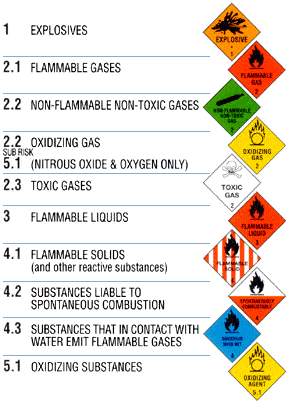Gas Safety
_________________________________________
GENERAL SAFETY
_________________________________________
SAFE HANDLING OF CYLINDERS
_________________________________________
CYLINDER IDENTIFICATION
_________________________________________

Safety Tips
Safe Handling and Storage of Compressed Gas Cylinders
Before moving or transporting gas cylinders
- Read the product label to confirm that you have the proper product and to identify the related hazards before loading the cylinder into your vehicle.
- Ensure that the cylinder valve is fully closed and the protection cap (where applicable) is secured in place.
- DO NOT SMOKE when handling or transporting these products.
While moving full or empty cylinders
- Always use carts or hand trucks designed for this purpose.
- Never drop cylinders or allow them to strike each other violently
- Never lift cylinders by the cap or with a lifting magnet.
Safe Storage Practices
- Store cylinders upright, single cylinders should be secured in place using stands, clamps, a cylinder cart or other securing devices.
- A gas cylinder is especially dangerous for the reason that the gas is at extreme pressure, and if the cylinder falls over and its valve strikes something and is knocked off, the tank will effectively become an extremely deadly flying missile.
- Keep stored cylinders out of high traffic areas or in areas where there are activities that could damage or contaminate the cylinders.
- Electric Arc Welding can destroy the integrity of cylinder metal if a welder carelessly strikes an arc on a cylinder.
- Never store cylinders with flammable materials.
Safe Transportation of Compressed Gases
- DANGER! All compressed gases may pose hazards when transported. Flammable gas from a leaking container in the trunk of a car can be ignited by a spark from a brake light, tail light, or turn signal. It is not safe to transport acetylene, LPG or other compressed gases in enclosed passenger vehicles. The preferred vehicle for transporting compressed gases, especially flammable gases, is one with adequate ventilation, such as the back of a pick up truck. Never put acetylene cylinders in confined compartments such as the trunk of a car.
- Make sure the cylinder is secured upright within the vehicle.
When using flammable gases (fuel gases)
- Always use the correct personal protective equipment for the associated application such as eye protection, face protection, hand & arm protection etc.
- Always check gas fittings & hoses prior to use as leaking fittings may catch fire during use and pose a risk to personnel as well as property.
- Fuel gases that are denser than air such as propane and butane, may collect in low areas if allowed to escape. To avoid an ignition hazard, special care should be taken when using these gases over areas such as basements, sinks, storm drains etc.
- Flashback is the condition of the flame propagating down the hoses of an oxy-fuel welding and cutting system. To prevent such a situation a flashback arrestor is usually employed. The flame burns backwards into the hose, causing a popping or squealing noise. It can cause an explosion in the hose with the potential to injure or kill the operator. Using a lower pressure than recommended can cause a flashback.
Contact your local BJ Howes or Metaland branch for further safety information. BJ Howes and Metaland stock and supply a large range of safety equipment such as personal protective equipment and flashback arrestors. Our friendly experienced staff can provide solutions both cost effective and technical for all your safety applications.
The following are useful links to further safety information
- Standards Australia http://www.standards.org.au/
- Workcover NSW http://www.workcover.nsw.gov.au
- National Safety Council of Australia http://www.nsca.org.au/
- Australia and New Zealand Industrial Gas Association http://www.anziga.org/
- NSW department of environment, climate change & water http://www.environment.nsw.gov.au
View the full range of our industrial, hospitality and medical gases below:
Fuel Gases
Laser Gases
Hospitality Gases
Medical Gases
Shielding / Welding Gas
Trade’N’Go Gas






